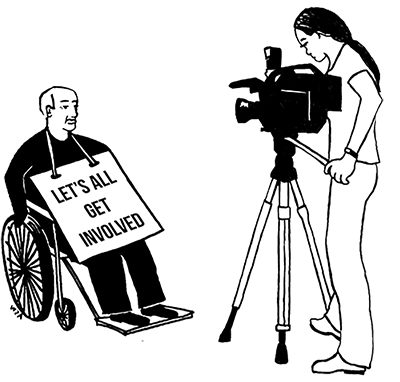What is Your Role?
If you speak to the media, be clear whom are you representing. You can always speak to the media as a concerned resident. If you want to speak on behalf of a community group or organization (e.g. your community health centre), make sure first that it is your role or that you have their permission.
What Will You say in Media Interview?
If a journalist is interested in speaking with you, take time to prepare. You want your words to make a difference. You want people to take action after hearing or reading your words. A journalist might interview you for ten minutes, but that interview could be edited down to just a few seconds on TV or just a few lines in an article.
Refer back to “Develop Key Messages: What Information Help People Act?”.
- Ask yourself the: what, where, why, when of your story
- WHO and WHAT is the story about?
- WHEN is the event taking place? Or, when does this issue need to be resolved?
- WHY is it a problem? Why does this matter to your community?
- WHAT is needed to solve the problem? What action do you want people to take?
- Revise your message to make it short and clear. Use simple language.
- Be prepared to give your message in a 10 – 20 second “sound bite”. “Sound bite” is media language for a short statement.
- Consider how to cover all your messages in the time available
- Practice saying your message so you can say it with ease.
- Consider your responses. Think what questions you might be asked and how you might answer them. What is the worst question they might ask? How can you best respond so as to reinforce your main message?
During the Interview:
- Be yourself.
- Know you have something important to say. Your views matter!
- Take a deep breath before you begin. Speak calmly. Remember that you want the reporter’s story to motivate people to take action.
- Listen carefully. Make sure you understand the question. If you do not understand, ask the reporter to re-phrase it.
- Not sure what you want to say? Take a moment. Ask the reporter to repeat or clarify a question while you think of how you will phrase your comment.
- Avoid yes/no answers. Answer questions using full sentences. Provide examples and statistics if you know any. The reporter wants to hear what you have to say.
- Keep on your message. Use every question as an opportunity to re-state your main message in different ways.
- Choose the information you will share. You do not have to answer all the questions a reporter might ask. If the reporter asks a question that is too personal about your story, you do not have to answer. You can say, “I do not feel this is an important part of the story.”
- If you don’t know the answer, don’t make it up. If the reporter asks a question to which you don’t know the answer, then tell them. Promise the reporter you will get back to them. Then make sure you do get back to them before their deadline.
- Expect repetitive questions. It is normal for the journalist to ask you the same question more than once. This gives you a chance to give a shorter answer, or a more clear answer than the first time.
- Chose your clothes carefully. A neat appearance is best when you are representing your community. Do not wear jewellery that will distract a viewer or jingle into a microphone. Don’t chew gum. Remove sunglasses and hats. If you normally wear make-up, apply more than usual. Do not wear plaid or patterns for a TV interview, because they do now show well on TV. If you have a symbol that conveys your message, like a scarf or button, be sure to make it visible.
After the Interview:
Following your interview, take a couple of minutes to evaluate your message delivery. Ask yourself, and ask others, who were present, if you were able to:
- Communicate your key messages. How many of the 3-4 messages were you able to include in your interview?
- Use a calm voice. Avoid responding with strong emotions
- Speak concisely, using short and clear phrases.
- Use simple language. Avoid jargon.
- Maintain eye contact with the journalist.
- Use a tone of voice and facial expressions that match the topic. For example, if you are concerned, then reflect that feeling in your voice tone and facial expression.
